| Srl | Item |
| 1 |
ID:
131624


|
|
|
|
|
| Publication |
2014.
|
| Summary/Abstract |
European Union (EU) interventions in conflict countries tend to focus on governance reforms of political and economic frameworks instead of the geopolitical context or the underlying power asymmetries that fuel conflict. They follow a liberal pattern often associated with northern donors and the UN system more generally. The EU's approach diverges from prevalent governance paradigms mainly in its engagement with social, identity and socio-economic exclusion. This article examines the EU's 'peace-as-governance' model in Cyprus, Georgia, Palestine and Bosnia and Herzegovina. These cases indicate that a tense and contradictory strategic situation may arise from an insufficient redress of underlying conflict issues.
|
|
|
|
|
|
|
|
|
|
|
|
|
|
|
|
| 2 |
ID:
131122
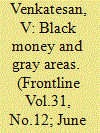

|
|
|
|
|
| Publication |
2014.
|
| Summary/Abstract |
The decision to constitute a special investigation team to investigate cases of black money stashed away in foreign banks will prove to be an acid test for the Narendra Modi government as the fight against the black economy, calls for the strong political will.
|
|
|
|
|
|
|
|
|
|
|
|
|
|
|
|
| 3 |
ID:
123356
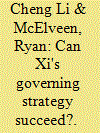

|
|
|
|
|
| Publication |
2013.
|
| Summary/Abstract |
[W]ithout gradual but bold reform of the legal system, media openness, and a more accountable and representative political structure, the next phase of economic reform will not go far.
|
|
|
|
|
|
|
|
|
|
|
|
|
|
|
|
| 4 |
ID:
132307
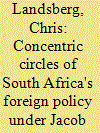

|
|
|
|
|
| Publication |
2014.
|
| Summary/Abstract |
South Africa's foreign policy could be viewed as a set of concentric circles which define the Republic's international priorities. In an attempt to bring coherence and predictability to them, the Zuma government has tried to learn from its predecessor, the Mbeki government (1999-2008), by putting emphasis on key international relations and concerns, and the idea was suggested that these different layers reinforced each other.
According to stated policy, pursuit of the national interests lay at the heart of the Republic's international strategies and came to be regarded as the new glue that holds it together, albeit it is four years into Zuma's government and the 'national interest' remains poorly developed and in need of expansion and implementation. A set of wider foreign policy concentric circles informs foreign policy, championed as 'Pursuing African Advancement and Enhanced Cooperation'. This agenda was to be pursued under a series of sub-goals or sub-categories, for our purposes concentric circles, namely (a) closing the gap between domestic and foreign policy; (b) continued prioritisation of the African continent-the Mbeki government called it African Agenda, or Africa first policy; (c) strengthening South-South relations; (d) strategic relations with strategic formations for the North; (e) participating in the global system of governance and (f) strengthening political and economic relations. While these six pillars were clearly developed on paper, and self-standing, how they all relate to the epicentre of the national interest and overlap one another is not so clear. More serious effort is needed on the part of government to close this lacuna, and the idea of coherence between them should not be assumed if there is to be consistency between them and the stated annulus of national interest.
|
|
|
|
|
|
|
|
|
|
|
|
|
|
|
|
| 5 |
ID:
132574
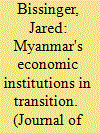

|
|
|
|
|
| Publication |
2014.
|
| Summary/Abstract |
Improving the business environment has been a major aim of Myanmar's reforms. However, the formal and informal economic institutions that govern exchange and shape the business environment changed significantly under a half-century of socialist and military government. The socialist leadership eliminated many market-supporting institutions made unnecessary because economic activity was to be state planned. Under this framework, personal exchange became dominant and control of economic life widespread. The military government revived market exchange, but many institutions from the socialist era remained and continue to constrain private business today. Thus, the strict economic controls, arbitrary policy-making and lack of processes that affect businesses in present-day Myanmar have direct institutional links with former regimes. They distort the structure of the economy, incentivize clustering in particular sectors and promote the use of networks and personal exchange. As other countries have shown, successful reform is a long process requiring more than changes in the formal institutions of regulation.
|
|
|
|
|
|
|
|
|
|
|
|
|
|
|
|
| 6 |
ID:
128990
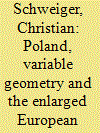

|
|
|
|
|
| Publication |
2014.
|
| Summary/Abstract |
This article examines the role of Poland in the European Union, where the traditional Franco-German leadership axis has been replaced by a new 'variable geometry' of leadership constellations across a variety of policy areas. In this setting Poland has the potential to move from maintaining an initially passive role as a policy-taker towards becoming an agenda-setter alongside other larger and more traditionally dominant member states, especially Germany. However, Poland's success in this matter and subsequent influence on a variety of European Union policy areas, particularly the single market and the European Union's external relations, will substantially depend on the extent of its economic recovery from the effects of the global economic recession and wider developments in the European Union's debt crisis as well as its willingness to engage in constellations of member states that go beyond its traditional partners.
|
|
|
|
|
|
|
|
|
|
|
|
|
|
|
|
| 7 |
ID:
131125
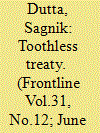

|
|
|
|
|
| Publication |
2014.
|
| Summary/Abstract |
A new OECD declaration paves the way for access to information on bank accounts in tax havens like Switzerland, but is still skewed in favour of such tax havens.
|
|
|
|
|
|
|
|
|
|
|
|
|
|
|
|
| 8 |
ID:
128123
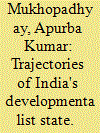

|
|
|
|
|
| Publication |
2013.
|
| Summary/Abstract |
Serious minded scholars on Indian politics had no illusion about the socialist credentials of the Nehruvian state. They only felt that this state would provide some of the basic prerequisites for the lives of common men and women following a revised agenda of liberal democratic social reforms. They also expected this state to preserve and pronote some of the basic norms of democratic state building through suitable institutions arrangements.
|
|
|
|
|
|
|
|
|
|
|
|
|
|
|
|
| 9 |
ID:
131123
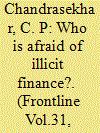

|
|
|
|
|
| Publication |
2014.
|
| Summary/Abstract |
Illicit capital outflow has increased significantly after neoliberal policies were introduced in 1991. Committed as it is to the same economic model, can the NDA government curb generation of black wealth and bring back the black money stashed abroad?
|
|
|
|
|
|
|
|
|
|
|
|
|
|
|
|